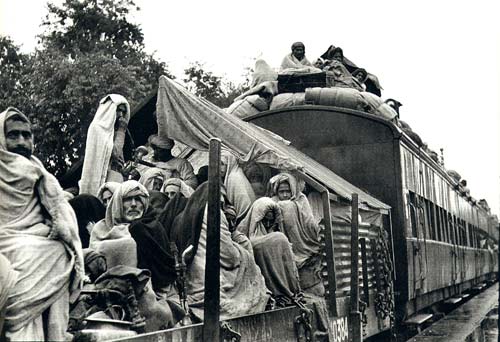Tags
1946, astrology, book review, feminism, Hindu, historical fiction, improbable premise, India, literary fiction, Melody Razak, Muslim, Pakistan, Partition, pointless prologue, rape, superstition, vignettes, violence, visceral narrative
Review: Moth, by Melody Razak
Harper, 2022. 353 pp. $27
Some novels have such a visceral effect that no matter what else they lack, they grab you by the scruff of the neck and compel you to finish them. Moth is one.
Delhi in 1946, like the rest of India, is seething as independence from Britain approaches. Violence between Hindu and Muslim increases daily, anticipating the forthcoming partition of the country to create the Muslim state of Pakistan. The loss of territory and forced relocation of populations has both sides ready to kill—or to rape women and girls of the enemy faction, sometimes abducting them afterward.

A refugee train, Punjab, 1947, photographer unknown (courtesy http://www.namdar.net/Partition1947.htm via Wikimedia Commons; public domain)
Alma, fourteen-year-old daughter of university professors, hears her worried parents discuss these events but listens with only half an ear. She’s focused on her wedding, only weeks away, to a groom eight years her senior, a man of excellent family about to begin his medical studies. Alma has met him just once, briefly, and looks forward to her marriage with stars in her eyes.
One might ask how two educated intellectuals of feminist leanings would allow their daughter to marry at such a young age, especially a girl like Alma. She’s intellectually precocious but emotionally immature, socially inept, and given to wild fantasies about spirits and the natural world.
However, Daadee Ma, her father’s mother, has arranged the match on the most appalling of motives: that the girl represents the evil eye and must therefore be sent away. And to make that happen, Daadee Mas gone to the astrologer—always consulted in such matters—with a made-up birth date, hoping to conceal Alma’s deficiency:
She had to do it. The girl’s horoscope was shocking. It makes Daadee Ma queasy to think of it. Who would marry a girl like that? No one, that’s who, and the family name soiled, stinking of mutton fat, and everyone talking. For shame. The wedding will be rushed, when everyone knows that a tip-top, Class-A wedding takes time to plan.
Cinderella’s wicked stepmother was a piece of cake by comparison. Yet somehow Daadee Ma’s son and daughter-in-law trust her arrangements, believing that in these dangerous times, the flighty, headstrong girl needs a husband’s guidance and protection. So much for feminism—or, for that matter, minimum standards of parenting.
From this perhaps tortured premise much misery results. You get a hint that something’s gone horribly wrong before the story begins, for a prologue hints at infanticide. Is Alma the killer? As usual, I can’t stand this device, which here seems intended to inform the reader that Something Significant Will Happen, and to be patient until it does. An inauspicious start.
Furthermore, to make the parental lapse credible, Razak portrays Alma’s mother and father as weak-willed, not to say negligent. They’re ineffectual liberals who can’t open their mouths to safeguard their daughter when they must know Daadee Ma’s a piece of work.
But I’ll give Razak this: her characters are original and flawed, with no one heroic in sight. Even Alma’s six-year-old sister is halfway sociopathic, so there’s not a ton of sympathy lying around.
But if you can get past that, and I urge you to try, Razak takes a deep dive into the social and cultural fabric that’s India emerging from colonial subjugation. I know of no other novel that focuses with such unflinching bravery on the terror and pain Indian Hindus and Muslims visited on each other back then, and since that strife continues today, Moth is a novel that matters.
It’s also utterly riveting, a narrative that shows a nation’s violent, self-destructive birth pangs—and, as with any birth, women bear the burden. Almost eighty years on, they still do.
At the center, Alma’s hopeful naivete breaks your heart. Putting a spoiled schoolgirl in the path of a national tornado is an unequal contest, but much depends on how she responds. The prologue says too much, and the main narrative sometimes feels like short stories strung together, which fail to cohere or build to a climax.
Still, these collected incidents or vignettes have powerful moments and reveal much about the time and place. I only wish the story progressed at a quicker pace; the middle third seems dedicated to intermittent backstory, which, though often intriguing, has little bearing on the plot. Unlike the narrative, Alma’s character follows an arc, but she’s offstage for quite a while.
Despite that, however, I can’t turn away from Moth or dismiss it for its flaws. See what you think.
Disclaimer: I obtained my reading copy of this book from the public library.
